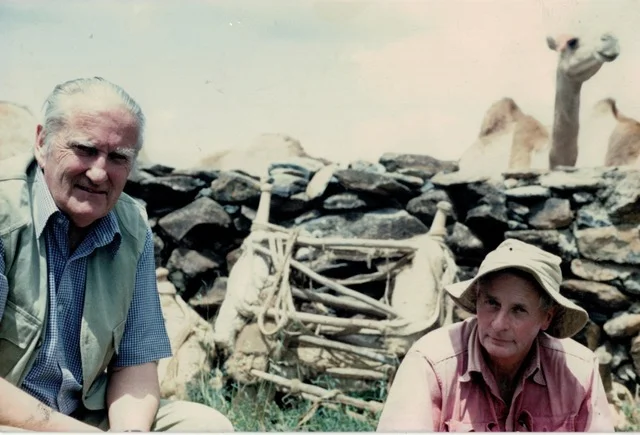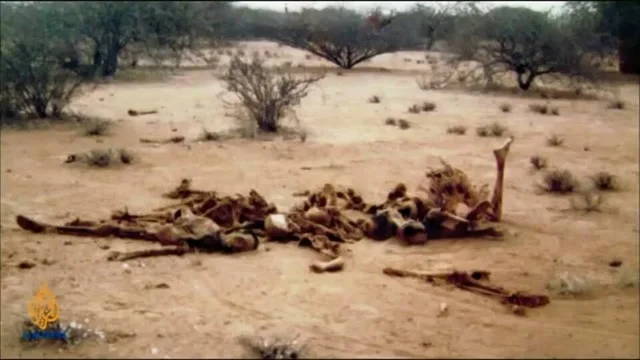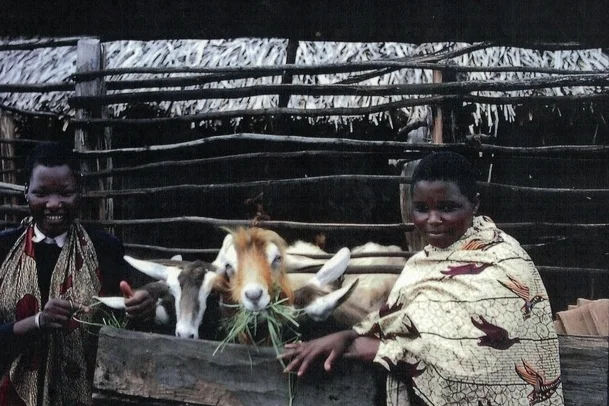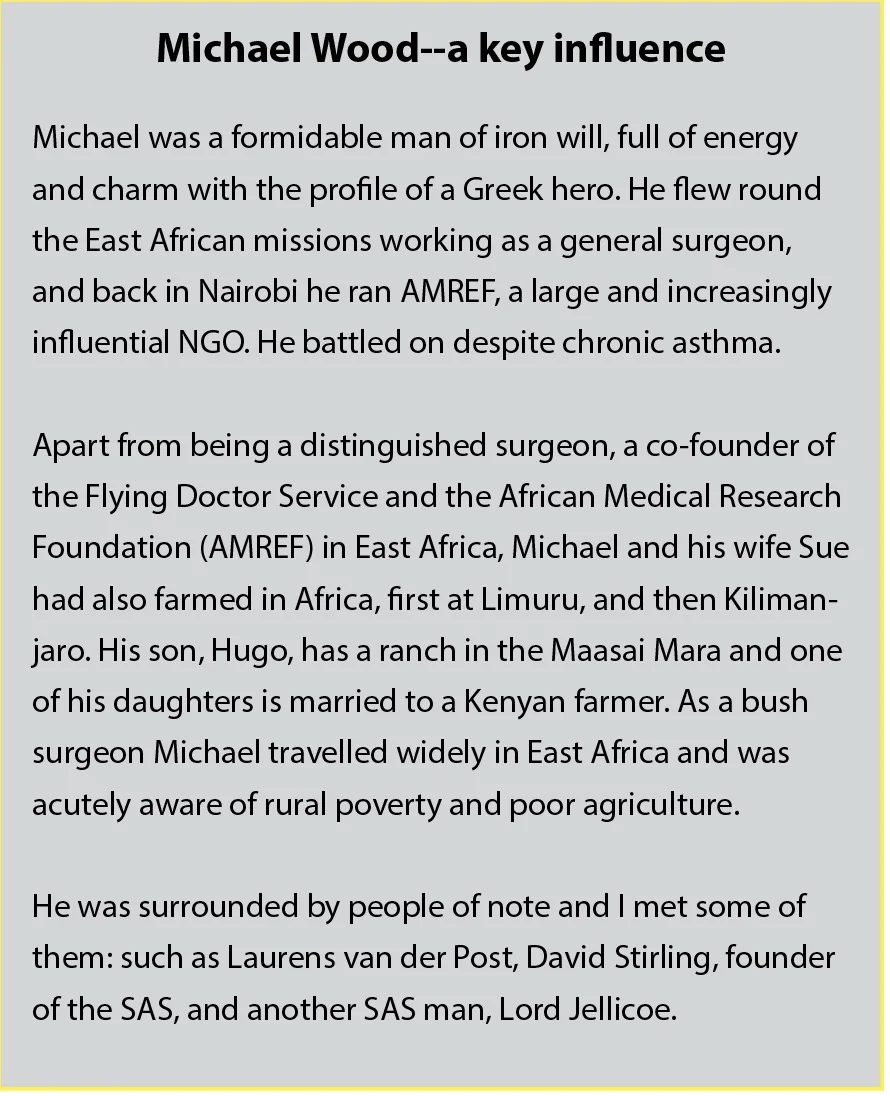MEMOIR
A FAMILY MEMOIR -page 8
Michael worried me at first by bypassing our office and sending his requests for funds straight to Oxford. Finally, I said him that we could not even consider assisting AMREF if he operated in this way. ‘I’m so sorry,’ he said with a smile. ‘I will work direct with you in future.’ And he did. I also used to worry about his use of the phrase ‘Go an extra mile’, adapted from Jesus’s Sermon on the Mount and the Roman Impress Law, but I can now see how wise and relevant it is.
Sir Michael Wood (left) and I worked together to set up FARM Africa. Here he is with Jasper Evans, of Rumuruti ranch, northern Kenya, where we set up our first camel development project.
The tangled human remains of the Wajir massacre, about to be bulldozed into a pit and buried. This terrible event brought Michael Wood and me together as a working partnership to start FARM Africa.
In the fourth year of my time as the OXFAM rep there was an appalling massacre in Wajir district in the North Eastern Province of Kenya, primarily inhabited by ethnic Somalis. While the numbers have never been officially recognized, at least 200-300 Degodia Somali men, who did not possess Kenyan papers, were rounded up by Kenyan security forces and taken to the Wagalla airstrip where they were starved of food and water for five days before being burnt alive (I saw photographs of the bodies being cleared off the strip by a fork-lift truck). This was clearly carried out on the orders of the District Commissioner who sat in his Land Rover watching the massacre. The huts of the Somali community living around Wajir were also burnt and many were killed, the wells sealed off and the people prevented from going to the mission hospital.
Michael had been alerted to the massacre by Sister Annalena Tonelli at the Wajir mission hospital and he suggested I joined him on a reconnaissance. The town had been sealed off by the police and Michael and I had intended to find a way in with medical supplies for the mission, relying on Michael’s prestige in Kenya and OXFAM’s international reputation. Michael suggested we worked together on this.
I contacted my OXFAM boss, Michael Harris, for permission to proceed. I feared that we might get expelled from Kenya. To his great credit Michael said, ‘get in your Land Rover with Michael Wood and go.’
We packed our vehicle with medical supplies and drove off. However, at the Wajir district border we were stopped by the police and held for 24 hours in a corrugated iron shed. We sat in great frustration in the station. We could hear urgent calls being made to Nairobi.
As we waited to hear our fate, Michael, who seldom spoke about himself, said: ‘I’m retiring from AMREF in a year. I have concluded after a life’s work as a surgeon in Africa that food is the best medicine. I now want to start an initiative to tackle the problem in new ways.’ I jumped at this: ‘I finish my contract with OXFAM next year. I too want to concentrate on food production. May I join you?’ This was the beginning of FARM.
The following morning, we were escorted back to Nairobi by the police. We started lobbying the government and the diplomatic community, and after several weeks OXFAM, AMREF and other agencies were allowed to return to Wajir, thanks partially I think to Michael’s great prestige in East Africa. The Wagalla massacre represents the worst human rights violation in Kenya’s history, but it took the Kenyan government until 2000 to acknowledge publicly any wrong doing on the part of its security forces and the victims’ families have still not been compensated. It later emerged that the Wajir operation was carried out on the instructions of the President’s Office in Nairobi but it was said to have ‘got out of hand.’
Michael asked friends in the UK to register FARM as a company limited by guarantee. Securing registration in Kenya proved more difficult. Michael phoned the Permanent Secretary, Ministry of Finance, 22 times to ask for a meeting to discuss our initiative. There was no reply, which was surprising because Michael knew the Permanent Secretary well and had treated his son. Finally, he went down to the PS’s office and sat outside his door until the PS arrived. The black mark against our names from Wajir might have been the problem but registration was granted. A great lesson in persistence.
FARM Africa
Michael built an office in the garden of his house in Karen and persuaded the British High Commission to loan us an old Land Rover. He broke into his pension fund to get us started.
Our organisation was called Food and Agricultural Research Mission (‘Mission’ shortly changed to ‘Management’). The name amused those who were close to Michael and aware of his preference for working with people he knew. AMREF was known as All Michael’s Relations and Friends and they immediately said how could FARM be called anything else –it clearly stood for Friends and Relations of Michael!
Michael’s circle of friends was indeed helpful and we drew in other contacts as well such as Sir Peter de la Billiere, of Gulf War fame, and an old family friend. Peter was a great asset to FARM but he and I did not work well together. On one occasion in Addis Ababa, after a pretty pointless argument, we both set off to the local running track to cool off. To avoid seeing each other too much we ran in different directions, clockwise and anti-clockwise. I passed him several times and then he disappeared. Perhaps he had had a heart attack as a result of his confrontation with me! I went to look for him. He hadn’t gone far: I found him running up and down a flight of steps as a keep-fit exercise. Later he apologised gracefully for his ill-humour and indeed we remain good friends to this day.
I started work with FARM in September 1985. Shortly afterwards Michael was knighted. He would charge into the office in the morning, swinging his arms as if he had just run a marathon. He would already have had a dozen new ideas while shaving and another dozen over breakfast. He sank into his old AMREF director’s chair and immediately started bombarding by phone his many contacts around the world for support for FARM.
FARM-Africa’s first goat project in Africa.
The big difficulty was that while we were both ‘fired up’ with a desire ‘to make a difference’ as Michael put it, we disagreed on many things and it was hard to find an accord: Michael had a profound knowledge of Africa and passionately argued for the need to make dramatic changes to food production. His aim was to ‘green Africa’ by the year 2000. I, with my more cautious OXFAM approach, thought that in the long term more would be achieved by working with poor communities and helping them to farm more productively. But his vision was an inspired one and led us on.



